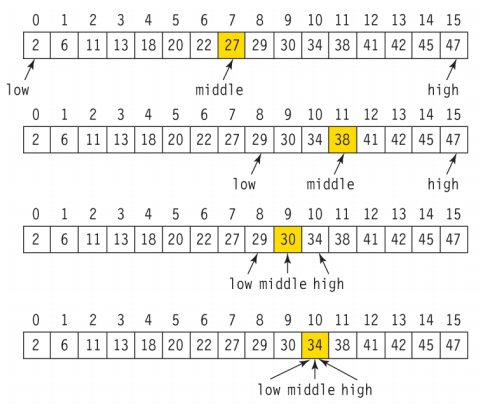고정 헤더 영역
상세 컨텐츠
본문
매일매일 한문제씩이라도 풀면서 감 잃지 않기를 바라는 마음으로 다시 시작 (8D라고 쓰는게 의미가 있나ㅎ)
[BAEKJOON 백준] 문제 > 단계별풀이 > 이분 탐색 https://www.acmicpc.net/step/29
* 이분 탐색, 이진 탐색 (Binary Search)
탐색 범위를 절반씩 좁혀가며 문제를 해결하는 방식으로, 배열 내부 데이터가 정렬이 된 경우에만 사용할 수 있다.
3개의 인덱스(시작, 끝, 절반)를 사용하며 탐색하며, 찾으려는 데이터와 중간값을 끊임없이 비교하며 원하는 값을 찾는 것이 포인트

1920. 수 찾기 (실버4) https://www.acmicpc.net/problem/1920
1트 코드는 메모리 초과로 인해 실패, 관련해서 찾아본 글 https://www.acmicpc.net/board/view/84136
Merge Sort의 경우 정렬하는 과정에서
int[] sorted = new int[A.length];
이와 같이 추가적인 배열을 선언해야 되기 때문에 O(n log n)로 속도가 빠르더라도 배열의 크기가 길어지면 그 만큼 차지하는 메모리의 공간이 늘어나서 메모리 초과가 나는 것 같습니다.
위의 글 보고 정렬하는 메서드를 바꾸고 조건문을 좀 바꿨더니 2트는 또 런타임에러임
이것저것 조건을 다시 보다가 결국 3트만에 해결!
public class Main {
static int[] a;
static int[] find;
static int ans=0;
static int n, m;
public static void main(String[] args) {
Scanner sc = new Scanner(System.in);
n = sc.nextInt();
a = new int[n];
for(int i=0; i<n; i++) a[i]=sc.nextInt();
m = sc.nextInt();
find = new int[m];
for(int i=0; i<m; i++) find[i]=sc.nextInt();
// Collections.sort(a);
Arrays.sort(a);
int start=0, end=n-1, mid=n/2;
for(int i=0; i<m; i++) {
ans=0;
if(a[0]<=find[i] && a[n-1]>=find[i]) findA(start, end, mid, find[i]);
System.out.println(ans);
}
}
static void findA(int start, int end, int mid, int x) {
if(start<0 || end >= n || start>=end) return;
if(a[mid]==x || a[end]==x || a[start]==x) {
ans=1;
return;
} else if(a[mid]<x) {
findA(mid+1, end, (mid+end)/2, x);
} else {
findA(start, mid-1, (mid+start)/2, x);
}
}
}그러고 구글링하다 보니 자바에는 이미 이진탐색(binarySearch()) 메서드가 있도라. 꼭 정렬된 배열에 사용할 것!!
import java.util.Arrays;
import java.util.Scanner;
public class Main {
static int[] a;
static int[] find;
static int ans=0;
static int n, m;
public static void main(String[] args) {
Scanner sc = new Scanner(System.in);
n = sc.nextInt();
a = new int[n];
for(int i=0; i<n; i++) a[i]=sc.nextInt();
m = sc.nextInt();
find = new int[m];
for(int i=0; i<m; i++) find[i]=sc.nextInt();
Arrays.sort(a);
for(int i=0; i<m; i++) {
ans=(Arrays.binarySearch(a, find[i]) <0 ? 0 : 1);
System.out.println(ans);
}
}
}이렇게 쉽게 풀릴 문제였었는데..
10816. 숫자 카드2 (실버4) https://www.acmicpc.net/problem/10816
꼭 이진탐색으로 풀어야하나 싶었지만, 유형이 이진탐색으로 분류된데에는 이유가 있지 않을까 싶어 고민하다 혼자 해결 못함
import java.io.*;
import java.util.*;
public class Main {
static int n, m;
static int[] arr1, arr2;
public static void main(String[] args) throws IOException {
BufferedReader br = new BufferedReader(new InputStreamReader(System.in));
StringTokenizer st;
StringBuilder sb = new StringBuilder();
n = Integer.parseInt(br.readLine());
arr1 = new int[n]; // 상근
st = new StringTokenizer(br.readLine());
int idx=0;
while(st.hasMoreTokens()) {
arr1[idx] = Integer.parseInt(st.nextToken());
idx++;
}
m = Integer.parseInt(br.readLine());
arr2 = new int[m]; // 찾는 카드
idx=0;
st = new StringTokenizer(br.readLine());
while(st.hasMoreTokens()) {
arr2[idx] = Integer.parseInt(st.nextToken());
idx++;
}
Arrays.sort(arr1);
for(int i=0; i<m; i++) {
int ans = upper(arr2[i])-lower(arr2[i]);
sb.append(ans+" ");
}
System.out.println(sb);
br.close();
}
static int lower(int x) {
int start = 0;
int end = n;
while(start<end) {
int mid = (start+end)/2;
if(x <= arr1[mid]) {
end = mid;
} else {
start = mid+1;
}
}
return end;
}
static int upper(int x) {
int start = 0;
int end = n;
while(start<end) {
int mid = (start+end)/2;
if(x < arr1[mid]) {
end = mid;
} else {
start = mid+1;
}
}
return end;
}
}첫번째 문제와 다르게 수를 찾고 끝내는게 아니라 그 수가 나타나는 구간을 찾아 총 개수를 구해야하는 문제이다.
그러다보니 배열 정렬 후 찾는 수가 발견되는 시작 인덱스(lower)와 마지막으로 발견되는 마지막 인덱스(upper)를 구해 그 구간 길이를 구해준다.
이해가 잘 되지 않아 요기 블로그를 참고했다. https://st-lab.tistory.com/267
[백준] 10816번 : 숫자 카드 2 - JAVA [자바]
https://www.acmicpc.net/problem/10816 10816번: 숫자 카드 2 첫째 줄에 상근이가 가지고 있는 숫자 카드의 개수 N(1 ≤ N ≤ 500,000)이 주어진다. 둘째 줄에는 숫자 카드에 적혀있는 정수가 주어진다. 숫자 카드
st-lab.tistory.com
- lower()
하한은 찾고자 하는 값 이상의 값이 처음 나타나는 위치를 말한다. 여기서 중요한 것은 '이상' 이다.
왼쪽 배열 인덱스 0부터 볼때 값이 같거나 큰 경우여야 처음 만나는 위치를 알 수 있다. - upper()
상한은 찾고자 하는 값을 초과하는 값을 처음 만나는 위치를 말한다. 마찬가지로 중요한 것은 '초과'이다.
하한과 반대로 찾고자 하는 값보다 큰 값을 찾아야하며 이 말은 반대로 찾고자 하는 값이 더 이상 넘어갈 수 없는 위치이기도 하다. - 찾는 값이 없는 경우
찾는 값이 없을때 lower와 upper은 동일한 값을 출력한다.
lower에서 찾고자 하는 값 이상의 인덱스를 반환하는데, 찾고자 하는 값이 없음으로 초과하는 값의 인덱스를 뱉어내고 upper도 똑같이 초과하는 값을 냄으로 두 인덱스는 동일하다.
아래는 대충 야매로 풀어서 시도하고 싶었던 코드.. 런타임에러(ArrayIndexOutOfBounds)로 실패함
import java.io.*;
import java.util.StringTokenizer;
public class Main {
static int n, m;
static int[] arr1, arr2;
static int[] cnt;
public static void main(String[] args) throws Exception {
BufferedReader br = new BufferedReader(new InputStreamReader(System.in));
StringTokenizer st;
StringBuilder sb = new StringBuilder();
n = Integer.parseInt(br.readLine());
arr1 = new int[n]; // 상근
st = new StringTokenizer(br.readLine());
int idx=0;
int max = Integer.MIN_VALUE;
while(st.hasMoreTokens()) {
arr1[idx] = Integer.parseInt(st.nextToken());
idx++;
max = Math.max(max, arr1[idx]);
}
m = Integer.parseInt(br.readLine());
arr2 = new int[m]; // 찾는 카드
idx=0;
st = new StringTokenizer(br.readLine());
while(st.hasMoreTokens()) {
arr2[idx] = Integer.parseInt(st.nextToken());
idx++;
}
cnt = new int[max+1];
for(int i=0; i<=n; i++) {
cnt[arr1[i]]++;
}
for(int i=0; i<m; i++) {
if(max<arr2[i]) sb.append(0);
else sb.append(cnt[arr2[i]]);
}
System.out.println(sb);
br.close();
}
}파이썬때부터 HashMap 만들어 빈도수 저장하고 찾는 그런 풀이를 자주 쓰는데 별로 안좋은거같아서 최근에는 문제 유형에 맞게 풀려고 노력중이다.
대충 되지 않을까 했는데 왜 안되는지 모르겠당 ㅜㅡ
하나 더 풀고싶은데 내일 출근 못할거같아서 오늘은 끝! 주말 내내 2문제 푼게 말이 되나 내일부턴 열심히 할거다 (아마도)
'취준 > 2. 코딩테스트' 카테고리의 다른 글
| [1일1커밋 9D] 백준 JAVA 14501, 13458, 14888 (0) | 2024.10.01 |
|---|---|
| [1일1커밋 9D] 유형별 풀이(2) 이진탐색 대충 끝 | 백준 JAVA 1654, 2805, 2110 (1) | 2024.10.01 |
| [1일1커밋 7D] 연휴 끝! 다시 시작하는 1일1커밋 챌린지 | SWEA S/W 문제해결 기본 4일차 (3) | 2024.09.23 |
| [1일1커밋 6D] 재귀 푸는 중.. | 백준 JAVA 27433, 10870, 25501 (1) | 2024.09.08 |
| [1일1커밋 5D] LeetCode SQL & 백준 JAVA 10431, 8979, 7568, 4659 (1) | 2024.09.06 |
댓글 영역